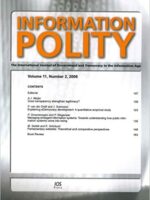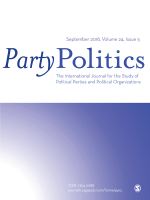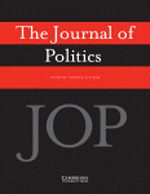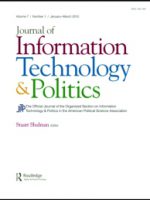Liam McCloughlin, Stephen Ward, Rachel Gibson & Rosalynd Southern. https://doi.org/10.3233/IP-190140. This paper examines the structure of Twitter communication networks between MPs during the 2016 EU Referendum campaign. In particular, the research examines the impact of Twitter in two dimensions: (1) how far social media might facilitate inter-party linkages thus eroding traditional … [Read more...]
When the Nerds Go Marching In: How Digital Technology Moved from the Margins to the Mainstream of Political Campaigns
When the Nerds Go Marching In shows how digital technology has moved from the margins to the mainstream of campaign and election organization in contemporary democracies. Combining an extensive review of existing literature and comparative data sources with original survey evidence and web content analysis of digital campaign content across four nations—the United Kingdom, Australia, France, and … [Read more...]
New Forms of Mobilization, New People Mobilized? Evidence from the Comparative Study of Electoral Systems
Pedro C Magalhães, John H Aldrich, Rachel K Gibson, https://doi.org/10.1177/1354068818797367 Mobilization efforts by parties and candidates during election campaigns tend to reach those who are more likely to vote in the first place. This is thought to be particularly consequential for turnout among the young. Harder and less cost-effective to … [Read more...]
Getting Out the Vote in the Social Media Era: Are Digital Tools Changing the Extent, Nature and Impact of Party Contacting in Elections?
John Aldrich, Rachel Gibson, Marta Cantijoch and Tobias Konitzer 2016. ‘Getting Out the Vote in the Social Media Era: Are Digital Tools Changing the Extent, Nature and Impact of Party Contacting in Elections?. Party Politics 22(2): 165-178 doi: 10.1177/1354068815605304 … [Read more...]
Moving Slowly up the Ladder of Political Engagement: A ‘Spill-over’ Model of Internet Participation
Marta Cantijoch, Rachel Gibson and David Cutts. 2015. ‘Moving Slowly up the Ladder of Political Engagement: A ‘Spill-over’ Model of Internet Participation.’ British Journal of Politics and International Relations First published online: | DOI: 10.1111/1467-856X.12067 … [Read more...]
Digital Media and Political Participation The Moderating Role of Political Interest Across Acts and Over Time
Bimber, B., Cunill, M. C., Copeland, L, and R. Gibson 2015 ‘Digital Media and Political Participation The Moderating Role of Political Interest Across Acts and Over Time.’ Social Science Computer Review, 33(1), 21-42. doi: 10.1177/0894439314526559 … [Read more...]
Civic Websites and Community Engagement: A Mixed Methods Study of Citizen Empowerment Initiatives
Marta Cantijoch, Silvia Galandini and Rachel Gibson. 2015. ‘Civic Websites and Community Engagement: A Mixed Methods Study of Citizen Empowerment Initiatives’ New Media and Society 2015 doi: 10.1177/1461444815616225 … [Read more...]
New media, elections and the political knowledge gap in Australia
Rachel Gibson and Ian McAllister 2014. ‘New media, elections and the political knowledge gap in Australia’ Journal of Sociology’ Online First doi:10.1177/1440783314532173. … [Read more...]
Is Online Participation Really Different to Offline
Rachel Gibson and Marta Cantijoch. 2014. ‘Is Online Participation Really Different to Offline?: Conceptualizing and Measuring E-Participation.’ Journal of Politics 2013 75 (3):701-716. DOI: http://dx.doi.org/10.1017/S0022381613000431 … [Read more...]
Online Ties and Political Engagement
Rachel Gibson and Ian McAllister. 2013. ‘Online Ties and Political Engagement’ Journal of Information Technology and Politics 10(1): 31-51. DOI:10.1080/19331681.2012.712461 … [Read more...]





